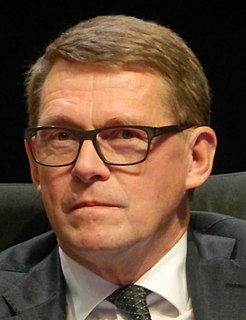
Matti Taneli Vanhanen is a Finnish politician who was Prime Minister of Finland from 2003 to 2010. He was also Chairman of the Centre Party, and in the second half of 2006 he was President of the European Council. In his earlier career he was a journalist. Vanhanen is the son of professor Tatu Vanhanen and Anni Tiihonen.

Gustav Adolf Bauer was a German Social Democratic Party leader and 11th Chancellor of Germany from 1919 to 1920. He served as head of government for a total of 219 days. Prior to becoming head of government, Bauer had been Minister of Labour in the first democratically elected German cabinet. After his cabinet resigned in March 1920, Bauer served as vice-chancellor, Minister of Transportation, and Minister of the Treasury in other cabinets of the Weimar Republic.

Hermann Müller (help·info) was a German Social Democratic politician who served as Foreign Minister (1919–1920), and twice as Chancellor of Germany in the Weimar Republic. In his capacity as Foreign Minister, he was one of the German signatories of the Treaty of Versailles in 1919.

Prussia was a historically prominent German state that originated in 1525 with a duchy centred on the region of Prussia on the southeast coast of the Baltic Sea. It was de facto dissolved by an emergency decree transferring powers of the Prussian government to German Chancellor Franz von Papen in 1932 and de jure by an Allied decree in 1947. For centuries, the House of Hohenzollern ruled Prussia, successfully expanding its size by way of an unusually well-organised and effective army. Prussia, with its capital in Königsberg and from 1701 in Berlin, decisively shaped the history of Germany.

Johann Ludwig "Lutz" Graf Schwerin von Krosigk was a German senior government official who served as Minister of Finance of Germany from 1932 to 1945 and de facto Chancellor of Germany in May 1945.

Hans Luther was a German politician and Chancellor of Germany for 482 days in 1925 to 1926. As Minister of Finance he helped stabilize the Mark during the hyperinflation of 1923. From 1930 to 1933, Luther was head of the Reichsbank and from 1933 to 1937 he served as German ambassador to Washington.

Hans Eichel is a German politician (SPD) and the co-founder of the G20, or "Group of Twenty", an international forum for the governments and central bank governors of twenty developed and developing nations to discuss policy issues pertaining to the promotion of international financial stability.
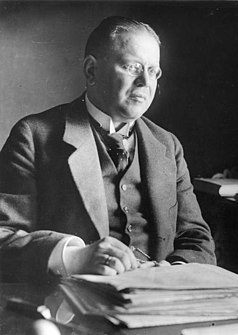
Matthias Erzberger was a German publicist and politician, Reich Minister of Finance from 1919 to 1920.

The Federal Ministry of Finance, abbreviated BMF, is the cabinet-level finance ministry of Germany, with its seat at the Detlev-Rohwedder-Haus in Berlin and a secondary office in Bonn. The current Federal Minister of Finance is Olaf Scholz (SPD).

Wolfgang Schäuble is a German lawyer and politician of the Christian Democratic Union (CDU) party whose political career has spanned more than four decades. He is one of the most experienced and longest serving politicians in German history and since 2017 has been the President of the Bundestag.

Otto Friedrich Wilhelm Freiherr von der Wenge Graf Lambsdorff, known as Otto Graf Lambsdorff, was a German politician of the Free Democratic Party.

Ober Ost is short for Oberbefehlshaber der gesamten Deutschen Streitkräfte im Osten, German for "Supreme Commander of All German Forces in the East" during World War I. It also has an implied double meaning, as in its own right, "Ober Ost" translates into "Upper East," which describes its geographic region in reference to the German Empire. In practice it refers not only to said commander, but also to his governing military staff and the district they controlled: Ober Ost was in command of the German section of the Eastern Front.
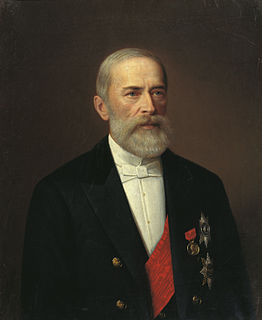
Nikolai Karl Paul von Bunge, more commonly known as Nikolai Bunge, was the Russo-German preeminent architect of Russian capitalism under Alexander III. He was a distinguished economist, statesman, and academician of the St. Petersburg Academy of Sciences. He had also served as the rector of the Kiev University and the Finance minister.
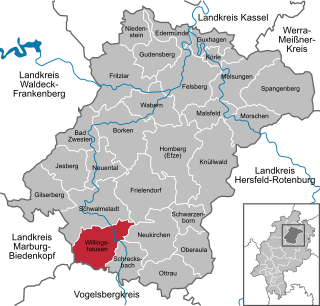
Willingshausen is a community in the Schwalm-Eder district in Hesse, Germany.

Franz Gerhard von Kügelgen was a German painter, noted for his portraits and history paintings. He was a professor at the Dresden Academy of Fine Arts and a member of both the Prussian and Russian Imperial Academies of Arts. His twin brother, Karl von Kügelgen, was also a painter of note.
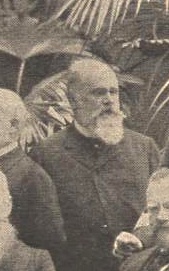
Hermann Guido Leopold Freiherr von Stengel was a Bavarian administrator, a German politician and Finance Minister of the German Empire from 1903 to 1908.

Johann Kasimir Kolbe von Wartenberg was the first ever Minister-President of the kingdom of Prussia, and the head of the "Cabinet of Three Counts".

Hans Loch was Chairman of the Liberal Democratic Party of Germany and Finance Minister of the German Democratic Republic.

Paul Moldenhauer was a German lawyer, economist and politician (DVP). He served as a German congressman (reichstagsabgeordneter) 1920-1932 and was Germany’s Minister of Finance and Minister of Trade and Industry in the late 1920s and early 1930s.

Gerhardt Wilhelm von Reutern was a Baltic-German military officer and painter who co-founded the Artists' Colony at Willingshausen.





















